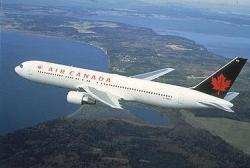Controversial Move To Fight Rising Fuel Prices May Force
Canadians To Roads
 Canadians will be
noticing some significant price increases for air travel as Air
Canada this week quietly began adding a fuel surcharge on flights
within North America.
Canadians will be
noticing some significant price increases for air travel as Air
Canada this week quietly began adding a fuel surcharge on flights
within North America.
As much as $120 may be added to any round trip ticket price as
the national carrier fights rising fuel costs. The new surcharges
of $20, $40 and $60 will be put on every one-way ticket flying
within Canada and the United States in three categories: short-haul
flights under 300 miles, 300 to 1000 mile medium range flights, and
long-haul flights beyond 1000 miles.
The Ottawa Citizen reported a national consumers group said
Friday that the announcement by Air Canada will surely affect how
often Canadians fly. "This is a significant increase," said Mel
Fruit, vice-president of the Consumer Association of Canada to the
Citizen. "Canadians will now think let's drive instead of flying or
not go at all."
Though understanding gas prices in the country are spiking,
Fruit said he disagrees with the way Air Canada is handling the
shortfall.
"We're getting very annoyed that airlines treat their customers
with contempt," he said. "It's misleading that the ticket price
means absolutely nothing now with all these surcharges and fees.
This has been going on for so long. This is the breaking
point."
Peter Fitzpatrick, a spokesman with Air Canada, said fuel usage
is the largest expense Air Canada has and though the airline had
been debating for a long time on adding the extra fuel surcharge,
they felt like there was no other choice.
The airline states their jet fuel costs increased by 78 percent
in the past year. On Thursday, Air Canada reported a $288 million
loss in the first quarter alone, mainly because of the added cost
of fuel.
"We are feeling the pressure of rising gas prices like every
business," he said. "It's a decision we didn't take lightly. Even
with this new fee, we are not recouping the full added cost of
fuel."
Fitzpatrick said the company spent $2.5 billion on fuel last
year, and has tried many operational methods to save on gas.
 The fee is listed on
tickets as a line item prior to purchase and is not reflected in
advertised prices for travel. The idea of adding the cost of fuel
into advertised prices was rejected due to prices changing too
quickly.
The fee is listed on
tickets as a line item prior to purchase and is not reflected in
advertised prices for travel. The idea of adding the cost of fuel
into advertised prices was rejected due to prices changing too
quickly.
The surcharge allows the airline to respond to higher or lower
prices by altering the level of the fee.
When booking their tickets online, passengers may not
immediately identify the added cost. The fee is hidden within a
line that simply says "NavCan and surcharges" that is only broken
down if the user clicks on it.
The Canadian Transportation Agency says there are no regulations
that would force airlines to disclose the surcharge as part of
their advertised price.
Fuel surcharges are becoming a common mechanism for airlines
trying to recoup rising fuel costs. Most airlines, including Air
Canada, already have the added tariff on international routes
outside of North America. All major US carriers increased their
surcharge this week on North American flights, with an added cost
of $65 each way on some flights.
Fitzpatrick said Air Canada, with 1300 domestic, transborder and
international flights each day, feels the added cost to passengers
will not affect business.
"We have put some fare increases into effect and this hasn't
diminished bookings," he said. "People understand because they're
filling up their cars. They know about the high cost of fuel but
they do like to travel. Even with the new surcharge, it is still
reasonable to fly in Canada and the United States."
 ANN's Daily Aero-Term (04.20.24): Light Gun
ANN's Daily Aero-Term (04.20.24): Light Gun Aero-News: Quote of the Day (04.20.24)
Aero-News: Quote of the Day (04.20.24) ANN's Daily Aero-Linx (04.21.24)
ANN's Daily Aero-Linx (04.21.24) Aero-News: Quote of the Day (04.21.24)
Aero-News: Quote of the Day (04.21.24) ANN's Daily Aero-Term (04.21.24): Aircraft Conflict
ANN's Daily Aero-Term (04.21.24): Aircraft Conflict




